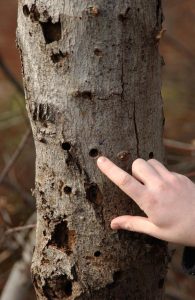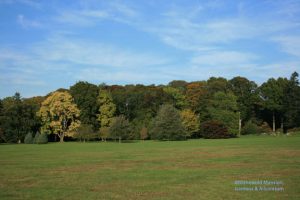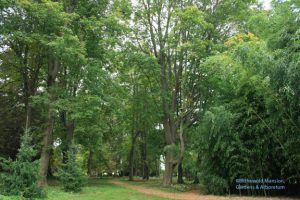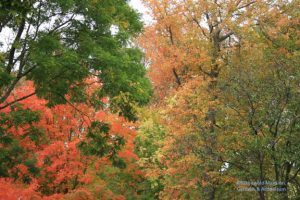Beware the Asian Longhorned Beetle
This is truly the stuff horror films and nightmares are made of: Last week the RI Department of Environmental Management released a report that the presence of Asian Longhorned Beetle (ALB) larva was suspected in a load of firewood delivered to a home in Cranston, RI. The wood came from a property in Worcester, MA known to be infested. Even though Cranston is all the way across the Bay from Blithewold, this hits just a little too close to home! The beetles themselves don’t range far from their chosen host tree, but the scary thing is, we do and it has hitchhiked on green wood from China to New York to New Jersey to Illinois to Massachusetts (not necessarily in that order) and now maybe even to little Rhody.
Remember when the USDA hired US Forest Service smoke jumpers to spot beetles at the tippy tops of Central Park’s treasured American Elms? That’s when I first became very aware of just how tragic and deadly an infestation would be. ALB feed on hardwoods – maple, horse chestnut, willow, and elm to name just a few of their favorites – and will kill their host and move on to the next tastiest choice. Infested trees have to be cut down, chipped immediately and even burned in order to stop the beetles from spreading. Adjacent hardwoods are also often removed and/or treated with pesticides and the neighborhood put under vigilant surveillance for signs of further invasion. The good news is, eradication is possible. Illinois has declared victory over ALB after a ten year push to rid it from several Chicago neighborhoods.
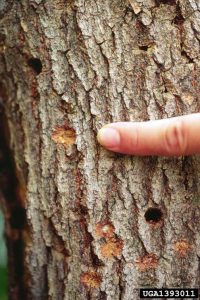 What we need to do is be wary and proactive. Buy firewood and nursery stock only from trusted sources and keep your eyes peeled for evidence of infestation. The beetles themselves are large (1-2″ with antennae), fairly flashy Cruella de Vil look alikes (the Chinese call them Starry Skies – a much too beautiful name) and are visible during the summer and as long as the temperatures remain warm. The females make tell-tale melon scoops in the bark of trees in which to lay their eggs and the other signs of infestation are centimeter/dime sized drill holes through the bark from which the adults emerge. If you see anything suspicious in any trees or wood around your house, stop, drop and call the DEM (the RI number is 401-647-3367) or report it to the USDA immediately – do not pass go! It’s very important that you not try to handle an infestation on your own. And it cannot be ignored without truly frightening consequences.
What we need to do is be wary and proactive. Buy firewood and nursery stock only from trusted sources and keep your eyes peeled for evidence of infestation. The beetles themselves are large (1-2″ with antennae), fairly flashy Cruella de Vil look alikes (the Chinese call them Starry Skies – a much too beautiful name) and are visible during the summer and as long as the temperatures remain warm. The females make tell-tale melon scoops in the bark of trees in which to lay their eggs and the other signs of infestation are centimeter/dime sized drill holes through the bark from which the adults emerge. If you see anything suspicious in any trees or wood around your house, stop, drop and call the DEM (the RI number is 401-647-3367) or report it to the USDA immediately – do not pass go! It’s very important that you not try to handle an infestation on your own. And it cannot be ignored without truly frightening consequences.
I absolutely can’t imagine life without the trees that I take for granted every day. Actually,I shouldn’t say that I take them for granted – this time of year at least, I’m completely riveted by them!
For more information: USDA – APHIS, RI Department of Environmental Management, Seattle Times article from May 2005 about smoke jumpers in Central Park.


